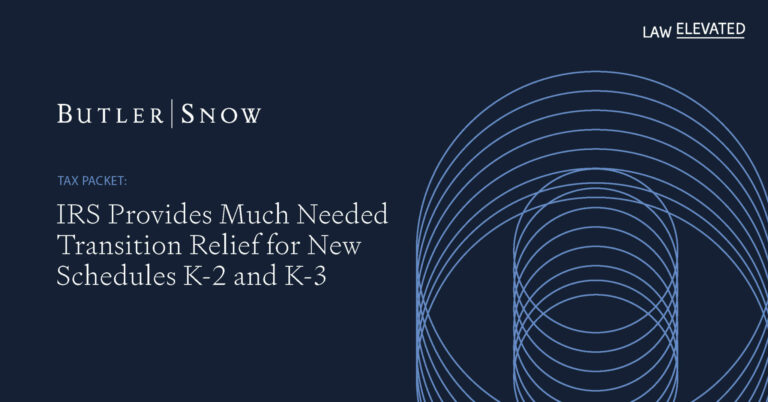On February 16, 2022, the IRS issued a news release along with a set of “Frequently Asked Questions” on new Schedules K-2 and K-3, which must be filed with IRS Forms 1065, 1120-S and 8865. This guidance was in response to widespread consternation among tax return preparers faced with the prospect of preparing these very long and complicated schedules in time for the 2021 tax filing season. Thankfully, the IRS provided transition relief under which certain domestic partnerships and S corporations will not have to file these new schedules for the 2021 tax year. However, tax return preparers and clients are strongly encouraged to get ready for full implementation of the requirement to prepare and file new Schedules K-2 and K-3, as further relief may well be unlikely.
The IRS created new Schedules K-2 and K-3 to provide greater consistency in reporting “items of international tax relevance” to partners and S corporation shareholders. Prior to these schedules, partners and S corporation shareholders obtained this information through whatever statements or schedules the partnership or S corporation decided to provide. Credit the IRS for creating a reporting mechanism that standardizes and improves the reporting of this information.
The outcry, however, arose after the IRS posted changes to the instructions to the new schedules on January 18, 2022. The updated instructions clarified that:
A partnership with no foreign source income, no assets generating foreign source income, and no foreign taxes paid or accrued may still need to report information on Schedules K-2 and K-3. For example, if the partner claims a credit for foreign taxes paid by the partner, the partner may need certain information from the partnership to complete Form 1116.
This change in the “Who Must File” section of the instructions caught many tax return preparers by surprise, as they had been operating under the assumption that a purely domestic partnership or S corporation with no foreign activities and no foreign partners or shareholders would not be required to attach Schedules K-2 and K-3 to its IRS Form 1065 or 1120-S, as the case may be. The outcry from tax professionals was loud and clear, because this change greatly expanded the scope of taxpayers required to complete these new schedules to include a partnership or S corporation with any direct or indirect partners or shareholders who claim foreign tax credits.
The most recent IRS guidance contains transitional relief for the 2021 tax year in FAQ #15. Under this FAQ, domestic partnerships and S corporations that meet all of the following requirements are not required to file Schedules K-2 and K-3 for 2021:
- In tax year 2021, the direct partners in the domestic partnership are not foreign partnerships, foreign corporations, foreign individuals, foreign estates, or foreign trusts.
- In tax year 2021, the domestic partnership or S corporation has no foreign activity, including foreign taxes paid or accrued or ownership of assets that generate, have generated, or may reasonably be expected to generate foreign source income (see Treas. Reg. §1.861-9(g)(3)).
- In tax year 2020, the domestic partnership or S corporation did not provide to its partners or shareholders nor did the partners or shareholders request the information regarding (on the form or attachments thereto):
- Line 16, Form 1065, Schedules K and K-1 (line 14 for Form 1120-S), and
- Line 20c, Form 1065, Schedules K and K-1 (Controlled Foreign Corporations, Passive Foreign Investment Companies, 1120-F, section 250, section 864(c)(8), section 721(c) partnerships, and section 7874) (line 17d for Form 1120-S).
- The domestic partnership or S corporation has no knowledge that the partners or shareholders are requesting such information for tax year 2021.
While this relief is welcome news for many tax return preparers, if a domestic partnership or S corporation that qualified for this temporary relief is subsequently notified by a partner or shareholder that all or part of the information contained on Schedule K-3 is needed to complete their tax return, then the partnership or S corporation must provide the information to the partner or shareholder. Further, if a partner or shareholder notifies the partnership or S corporation that it needs this information before the partnership or S corporation files its 2021 US tax return, the conditions for the exception are not met and the partnership or S corporation must provide Schedule K-3 to the partner or shareholder and file Schedules K-2 and K-3 with the IRS.
Foreign partnerships with no U.S. effectively connected income and no U.S. source income are not required to file IRS Form 1065. If a partnership does not have to file IRS Form 1065, the partnership will not be required to file Schedules K-2 and K-3. Although this recent guidance may be helpful to some partnerships and S corporations, tax return preparers should consider what additional steps they should take to be in a position to properly complete and file Schedules K-2 and K-3 going forward, as further relief may well be unlikely.
